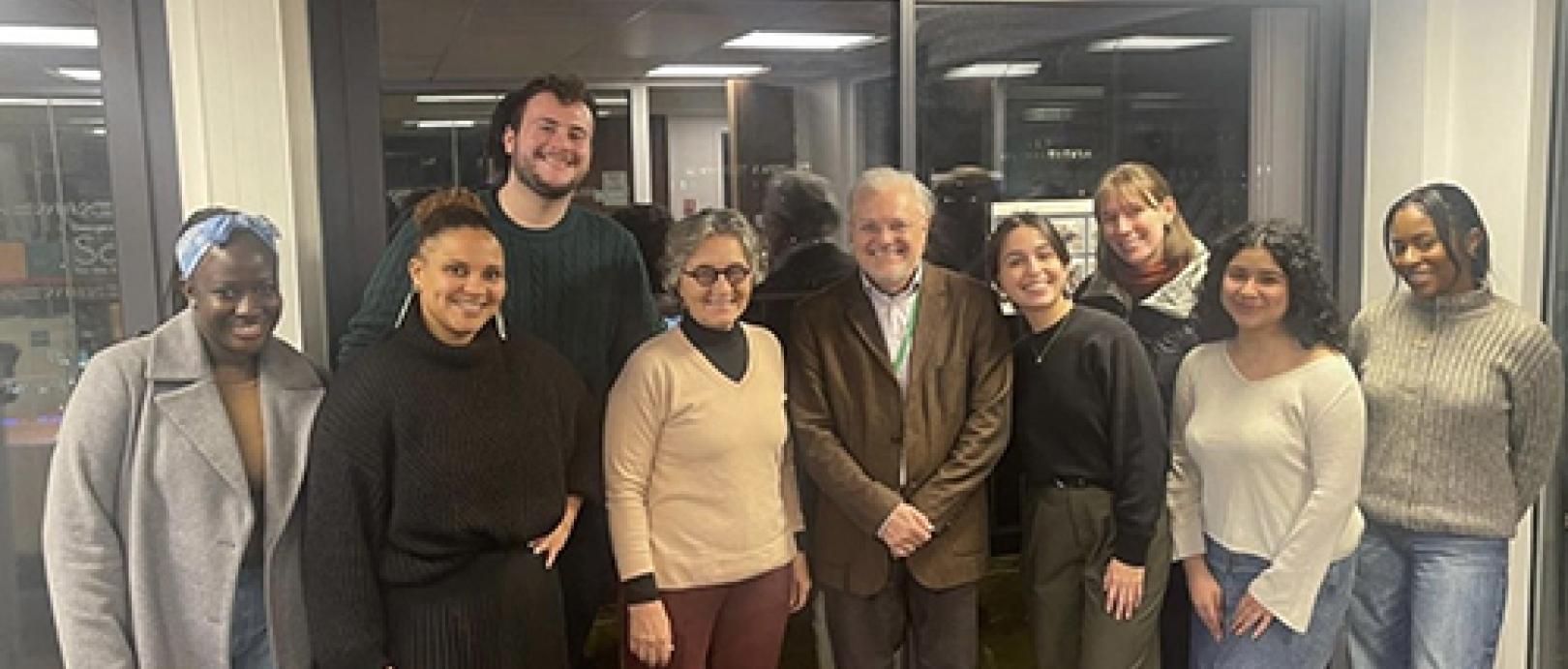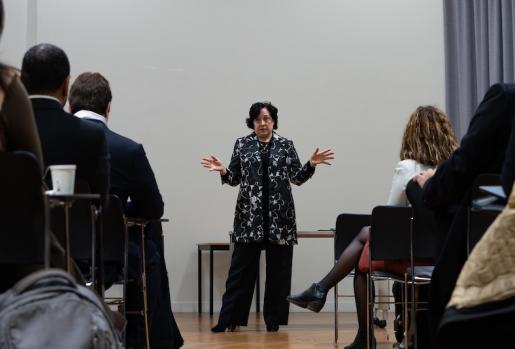MSc in Human Rights and Data Science
The MSc in Human Rights and Data Science prepares rising professionals to play highly specialized roles bridging the worlds of human rights and data science – an emerging and dynamic field of expertise in increasingly high demand.

Students gain fluency in the languages of both human rights and data science through foundational studies in international and human rights law and data science, including hands-on technical training in relevant software. Throughout the degree, students interact with leaders working at the forefront of the industry, and actively engage with the emerging issues of ethics and human rights protection. This forward-looking degree prepares students for the careers of the future.
Courses lead students to confront the ethical questions essential to emerging high tech industries such as data protection and artificial intelligence, ensuring that technological development complements human rights protections rather than impinging upon them. The program combines a rigorous foundation in data science with the legal and philosophical considerations necessary to ensure the ethical implementation of policies and protections. The program is concerned as much with the use of coding as with its development, and emphasizes the human and social costs of emerging digital technologies that come with their benefits.
Europe is leading the charge on data protection practices globally, and France has specifically played a critical role in the development of modern human rights legislation – making it the ideal location to become an expert in this emerging field. Experts from the CNIL, one of the most robust data protection watchdog organizations in the world, regularly teach and run workshops in our courses.
Master of Sciences in Human Rights and Data Science
- Duration 3 Semesters
- Entry time Fall
- Tuition and Fees €48,384
- Language English
-
Overview
The core curriculum of the MSc in Human Rights and Data Sciences provides students with expertise in two fields whose interweaving has become a necessity. The cross-disciplinary approach of this degree will put you ahead of the game, allowing you to develop the skills our complex world requires. It will teach you to think through real-world issues and develop your own ideas about how to solve contemporary problems related to the two main fields studied. Contact with experts in the field, in-class and outside the classroom enriches the experience and allows students to put to into practice the skills they develop.
Learning Objectives
The HRDS Program equips students with a competitive edge, offering a balance between a broad interdisciplinary academic approach and professional certification oriented toward industrial application. Students leave the program with a transferable skill set relevant to a wide range of industries, NGOs, and international organizations. Specifically, the program aims to provide students with:
- Students will demonstrate a robust foundation in international human rights law with respect to technology, data management and data protection.
- Students will demonstrate a comparative understanding of the European Union’s General Data Protection regulation (2018) with respect to other jurisdictions.
- Students will demonstrate a robust understanding of data science processes, techniques and tools and their ethical and lawful use.
- Students will demonstrate to have acquired the knowledge and skills necessary to serve as a Data Protection Officer or Data Manager.
Structure
The MSc in Human Rights and Data Science offers, over three semesters, a set of rigorous postgraduate courses drawing extensively from faculty expertise and the University’s well-established data science and international human rights curricula. You’ll have the flexibility to tailor your studies to your particular fields of interest, as courses relating to topics as varied as climate policy and health communications feature in the list of electives. Classroom experiences are further enhanced by experiential opportunities.
Students in the MSc in Human Rights and Data Sciences complete six 4-credit core courses, one elective chosen from among graduate offerings, two 2-credit modules to be chosen with an advisor, and a Capstone and Internship - OR - AUP Summer Institute for Human rights (10 credits).
Core Courses
Course Code Course Name Human Rights and Digital Technologies DS5060 Data Science I: Methods and Context DS5063 Data Industry Practicum (6 credits) DS5065 Data Science II: Theory and Practice LW5074 Advanced International Human Rights Law DS5081 Data Protection: Preparation to IAPP* DS5082 Advanced Data Protection* Internship, Thesis or Applied Project (6 credits) and Compulsory Seminar (2 credits)
As part of the MSc in Human Rights and Data Sciences, students may complete an internship. In France and across Europe, internships are usually unpaid placements, but offer students hands-on experience and open doors to careers in their specialized field. Students from the MSc in Human Rights and Data Sciences program have completed internships at international organizations like the OECD, UNESCO, businesses and humanitarian organizations, some of which have led to careers in those same organizations upon graduation.
Recommended Timeline (Fall Entry)
Fall Spring Summer or Fall 2 core courses
2 elective courses2 core courses
2 elective courses
Compulsory SeminarInternship & Capstone Professional Thesis
(4 & 6 credits)
or
Summer Institute (10 credits)16 credits 16 credits 10 credits Fall Timeline
Students may enter the program during the fall and complete the program in the equivalent of three semesters. We recommend the following timeline:
Fall Spring Summer/Fall DS5060 Data Science I: Methods and Context
LW5074 Advanced International Human Rights Law
DS5081 Data Protection Course - Preparation to IAPP certification: Certified Information Privacy Manager *
4-credits Graduate elective
DS5065 Data Science II: Theory and Practice
DS5063 Data Industry Practicum
DS/LW5039 Human Rights and Digital Technologies
Graduate module (Business, Climate Policy, Communications, DPO, Development, Health, Humanitarian, Law)
Internship and Professional Capstone Thesis
(4 + 6 credits)
OR
Summer
LW5091 Institute for Human Rights**
(10 credits)
2-credits module/course. DEPENDING ON PLACEMENT TEST:
Quantitative Platform for the Social Sciences GR5005
OR
Graduate module (Business, Climate Policy, Communications, DPO, Development, Health, Humanitarian, Law)
16 credits 16 credits 10 credits
* This module will guide students through the official IAPP preparation. At the end of the course, students may take the IAPP certification exam** Extra charges apply
Requirements and credit counts differ for the various Master’s programs at AUP. Please note that all requirements from previous years can be found in our archive catalogs.
Graduate students must maintain a cumulative grade point average (GPA) of 3.00. Students with a GPA of less than 3.00 will be placed on probation. Only two grades of C (or C+) may be counted towards an M.Sc. degree. Students do not earn credit for grades below C.
Program Director Claudia Roda and Professor Susan Perry are the UNESCO Chair in Artificial Intelligence and Human Rights.

The Human Rights and Data Science program at AUP is a founding member of the Academic Data Science Alliance.

The Human Rights and Data Science program at AUP is a partner of the International Association of Privacy Professionals.

Graduation
At AUP, students may graduate in the spring, fall or summer upon completion of their degree requirements; however, there is only one ceremony each May.

-
Experiential Learning
Practical, hands-on learning plays a key role in the curriculum, allowing students to fully explore the career paths available in often competitive fields. This experience gives them a competitive edge as they prepare to face the job market of the international career of their choice. Students will discover how, in the real world, disciplines intersect and experience in one field may help solve a problem in another. As they try their own hand, they will also learn directly from relevant professionals working in a wide range of industries.
The Data Industry Practicum
One experiential learning option specific to the MSc in Human Rights and Data Science degree is the Data Industry Practicum, a 6-credit series of intensive workshops with experts who are analyzing, in a practical way, the computational, legal, economic and ethical aspects of data use.
Over the course of the Spring semester, students take part in workshops with data industry professionals working in industries as varied as finance, product design and diplomacy. They not only meet and have intimate conversations with those working in the industry, but they get hands-on experience through assessed projects grounded in professional contexts related both to data science and to the legal and ethical implications of its use.
These meetings with experts offer two main benefits to students. First, they show students the full range of employment opportunities available to graduates. And second, they provide networking opportunities.
“These workshops allow students to position themselves career-wise with respect to the profession,” explains program director Claudia Roda. “It really helps build confidence and gives students a sense of the range of professions for which they are qualified.” The series opens with a workshop about one of the most well-known roles for graduates trained in both the legal and technical aspects of data use, that of Data Protection Officer (DPO), but later workshops cover subjects as varied as new technology’s impact on the financial sector and the challenges of the Metaverse for user privacy.
The practicum’s networking opportunities give students tangible connections to those working at the fascinating intersection of two exciting fields, most of whom work at the top of their industries. One 2023 workshop on the ISO standard on Privacy by Design, for example, led to some participating students being invited to contribute their work to an ISO document. One of them was even invited to present in person at an ISO meeting, creating further networking opportunities and enriching the student’s experience.
The practicum’s focus on professional contexts leaves a lasting impression on graduates.

Ecole de Guerre Practicum
The second main opportunity for students to gain experiential learning is the Ecole de Guerre Practicum. Students participate in our long-running conflict resolution simulation conducted in cooperation with the French War College. The practicum exposes participants to real-world examples of issues surrounding the ethical use of technology in warfare.
#000000
Summer Institute for Human Rights
The Summer Institute for Human Rights is an exciting capstone for students in the MA in Diplomacy and International Law and is also an option for those taking the MSc in Human Rights and Data Science. The three-week program is dedicated to exploring the intersection between human rights law and other relevant human rights fields.
#000000
The International Data Science & AI Leadership Summit
Volunteer students in the HRDS program participate in the International Data Science & AI Leadership Summit, co-organized by AUP and the Academic Data Science Alliance, under the auspices of the UNESCO Chair in Artificial Intelligence and Human Rights. The objective of this Summit is to open a dialogue on the multiple forms that DS and AI education may take in order to address the needs of a variety of stakeholders, including researchers across disciplines and students seeking to be competitive in 21st century job markets.
#000000 -
Faculty
Our faculty are both academic experts and industry professionals involved in EU-funded projects in the fields of technology and human rights, providing regular comments to UN agencies on the subject of human rights and digital technology.
The AUP’s close-knit graduate community ensures a high level of faculty–student interaction, including regular collaboration on research and professional projects.
Diversity, Experience, Versatility
Faculty in the program come from various countries with diverse backgrounds and professional experience. Just like students, the range of their life experiences contributes to rich exchange inside and outside the classroom. When it comes to bridging the academic and the professional, Claudia Roda ensures that the program is truly practical and guarantees that students are well-prepared for IAPP certification, where she is a member of the research advisory board. Other faculty and lecturers have a foot in the business world, while still others have had international careers only to return to AUP to lecture, like Alex Phoung Nguyen, Professor Phoung, a data specialists with experience working in human rights at the United Nations.

Claudia Roda
Program Director Claudia Roda is also the Co-founder of the Working Group on Human Rights and Digital Technology at AUP.
#182757Key News
Faculty regularly publish and speak at, and organize, international conferences. Recent examples include:
Professors Perry and Roda were co-chairs of the International Data Science and AI Leadership Summit, Paris May 19-20 2025.
Professor Roda organized the workshop 'How to Shape the Future of Consumer Protection: Privacy by Design (ISO 31700) in the World of AI', which took place at the CPDP 2025 conference in Bruxelles, May 21 2025.
Professors Perry and Roda have collaborated on a paper in the Journal of Human Rights Practice (Oxford University Press) focusing on AUP's Human Rights and Digital Technology course, on which they both teach.
Professor Roda was the keynote speaker at the conference: Faces/Phases of Humanoids: Ethics of Digital Surveillance, Sustainable World Models and Privacy Rights, Paris May 21 2025.
Professor Roda also published, in 2019, Communication in the Era of Attention Scarcity, a joint publication with fellow AUP professor Waddick Doyle.
Learn more in the Faculty Achievements Brochure
Program Director Claudia Roda and AUP Professor Susan Perry appointed co-chairholders for a UNESCO Chair in Artificial Intelligence and Human Rights.
 Charlene GabillatLecturer
Charlene GabillatLecturer Lee Ann Galindo PerezAssistant Professor
Lee Ann Galindo PerezAssistant Professor Amandine Kashani-poorLecturer
Amandine Kashani-poorLecturer Antonio KungLecturer
Antonio KungLecturer Quang Nguyen LuongAssistant Professor
Quang Nguyen LuongAssistant Professor Susan PerryProfessor, Program Director MAs in International Affairs
Susan PerryProfessor, Program Director MAs in International Affairs Claudia RodaProfessor, Program Director, MSc in Human Rights and Data Science
Claudia RodaProfessor, Program Director, MSc in Human Rights and Data Science“From issues of data bias to the transparency of the algorithms used, our challenge now is to find technical and regulatory solutions for the ethical use of AI.”
– Professor Claudia Roda -
Careers of the Future
We live in a changing world. As developments in Big Data, artificial intelligence and the Internet of Things transform the careers of the future, the world must develop concurrent principles for the ethical use of such technologies. An understanding of human rights and the legal framework surrounding data and human rights is primordial.
In fields as varied as digital commerce, warfare and humanitarianism, comprehensive the legal frameworks that protect individuals’ rights to data privacy are often backed up by technical solutions. The European Union’s General Data Protection Regulation (GDPR) has established a new normal of data privacy regulation for companies and organizations across the world. And in response to the GDPR, the IAPP has expressed the exponential increase in need for data protection officers to be appointed globally, citing the need for 75,000 new appointments, which is a number that is probably now outdated.
Where Students Have Interned
Not only does AUP offer career support services so students can discover paths they didn’t even know might be available to them, the program, given its tailor-made nature, also allows for students to gain hands-on experience before entering the working world.
Recent internships completed by Human Rights and Data Science students include:
- UNESCO - Education for Migration, Displacement, and Emergencies (EME) Division | Data Analyst Intern
- International Chamber of Commerce | Policy Intern
- OECD - Public Affairs and Communication Directorate (PAC team) | Impact and Evaluation Intern
- UNAIDS - Joint United Nations Programme on HIV/AIDS (UNAIDS) | Resource Mobilization Intern
- HP Tech Ventures | Market Research
- OECD - Network on Labour Market, Economic and Social Outcomes of Learning team under the Directorate for Education and Skills | Indicator Evaluation and Reporting for Education At A Glance Publication
- Stormcast Cinema | Data Analyst Intern
- Optimize Matter | Data Analyst Intern
- International Association of Department Stores | International Retail Market Analyst Intern
- AUP – Information Technologies Services | Data Management System Intern
Where Graduates Work
Since the start of the program, the individual attention offered by its format and size have allowed for the direct involvement of program faculty to help ensure students obtain relevant internships and careers following graduation.
In recent years, our graduates have gone on to work at organizations including:
- UNESCO - Education for Migration, Displacement, and Emergencies (EME) Division | Data Analyst Consultant
- Optimize Matter | Data Marketing Consultant
- European Public Law Organization - EPLO | Legal Trainee
- McGraw Hill | Data Ethics Analyst
- Accenture | Advanced App Engineering Analyst
- OECD Network on Labour Market, Economic and Social Outcomes of Learning team under the Directorate for Education and Skills | Research for Education at a Glance publication
- ACQUIRE AI | AI Regulatory Affairs Manager
- International Association of Department Stores - IADS | Head of Communications and Deployment
I am honored to work in a career where promoting privacy and data protection is both necessary and highly valued.

– Rebecca Stone G'23, Experience Research UXR Consultant 
Anna Ferguson G'23
While studying, Anna Ferguson also completed an internship with the OECD. Ferguson was placed within the impact team, and had the opportunity to work with such huge amounts of global and diverse data. Seeing what the OECD does as far as human rights and humanitarian efforts solidified Ferguson's professional goals for the future.
#000000
Dominic Spada G’23
Spada, alumnus graduating as part of the degree’s second cohort, is a Policy Intern at the International Chamber of Commerce. His work directly involves skills acquired while at AUP including around data governance, social policy, social innovation, international law, business development, regulatory affairs and research.
#000000
Alexis Fields '24
Fields continues to work to ensure that technology serves the needs of education, a cause that is dear to her. Her role at McGraw Hill fits her initial interests, given its online e-learning products for K-12 and higher education. She also currently volunteers with a local basketball organization that supports youth in her community.
#000000HRDS Advisory Board
Mission
The advisory board fulfills a dual mission: providing independent perspective and critical review of the program curriculum and operations, while actively supporting and championing the program, its strategic priorities, and long-term objectives. The advisory board plays a critical role in keeping the program aligned with the demands of a fast-changing labor market.
Appointment
Advisory Board’s members are appointed by the program directors in consultation with the provost. Appointments are for a period of two years renewable.
Board members act on a personal capacity with non-executive functions.
Meetings
The Board meets once per year, generally in March. Other meetings may be called by the program director.
Current Board Members
- Laurent Ach, former CTO Qwant, former CTO Rakuten France
- Marie-Clemence Canaud, Coordinator, OECD Health Statistics, OECD
- Régis Chatelier, Innovation and Foresight Project Manager - CNIL (Commission Nationale Informatique et Libertés), France
- Amandine Kashani-Poor, Déléguée à la protection des données chez AFD - Agence Française de Développement, France
- Yann Lechelle co-founder and CEO probabl.ai
- Maria-Martina Yalamova, VP Privacy Counsel at NBCUniversal Media, LLC, Madrid, Spain
-
Admissions
AUP’s graduate programs welcome applications from motivated, high-caliber individuals who feel they will thrive in AUP’s international and dynamic environment. When assessing applications, we take a holistic approach to identifying the next cohort of Graduate Global Explorers, considering education, experience and general fit with AUP values and curriculum.
Applicant Profiles
The MSc in Human Rights and Data Science welcomes applicants from a variety of backgrounds. This includes recent graduates who have majored in or taken classes in Math, Computer Science, Data Science and other related fields etc. We also welcome applications from professionals with experience in Data Science or the related legal frameworks looking to expand their knowledge or those who are looking to change direction in their careers.
Tuition and Scholarships
Depending on the length of your graduate program, the cost will vary. Find out more about tuition and costs for the MSc in Human Rights and Data Science.
AUP offers need- and merit-based scholarships to graduate students. The majority of our financial awards range from 25 percent to 50 percent of tuition and the average award amounts to about 30 percent.
Application Process
Our application process is simple and straightforward: students submit their information, send us their supporting documents, and receive their admission decision within three weeks.
- TOEFL - Internet Based Test (ibT) minimum score: 101. To have your results sent directly to The American University of Paris, use our institutional code 0866.
- Cambridge English - Advanced, or Proficiency level, minimum score: 185.
- TOEIC - Listening and Reading, minimum score 910. To have your results sent directly to The American University of Paris, use our institutional code 0866.
- IELTS - Academic Option, minimum score 7.0.
- Duolingo English Test: The test must include sub-scores for the 4 component elements. Minimum score required: 130.
- You have been living in Australia, Canada, Ireland, New Zealand, South Africa, the United Kingdom or the United States for at least two consecutive years and have recently studied in an all-English curriculum.
- You have studied for at least four years in an all-English curriculum in any other country, although we continue to reserve the right to request English test results from any applicant.
You can start your application process by creating an account on AUP’s Application Portal. You will be able to return to this page to finish and review your application prior to submission as often as you like.
Online Form
Each graduate program has its own application via the AUP Application Portal. You may only apply to one program.
The form will ask you to complete various details including contact details, background information and educational history. Your application will also require several supporting documents which can be uploaded directly in your online application in .pdf or .doc formats.
Transcripts
We require official transcripts covering all previous university coursework, including confirmation of an awarded bachelor’s degree or equivalent. All official documents must be submitted in English or French, or with a certified translation into one of these two languages. We recommend your transcripts demonstrate a minimum 3.0 cumulative grade point average (or equivalent).
Personal Statement
Applicants are required to submit a 500-word personal statement describing their reasons for applying to the program of their choice, drawing on relevant past undergraduate research or professional experience, as well as your career objectives.
Program Specific Items
Standardized tests, such as the GRE, GMAT, or LSAT are required for admission to some of the graduate programs at The American University of Paris and are listed below. Exemptions from this requirement are given to students from non-American universities and institutions, applicants with an M.A. degree, and mid-career applicants with a minimum of five years of professional experience following graduation.
CV / Resume
Applicants should submit a C.V. or resumé including university and/or employment history; community involvement; professional, and/or university extracurricular activities; and recognitions and achievements.
Letters of Recommendation
We require two letters of recommendation from individuals well-qualified to provide us with first-hand knowledge about your potential for graduate study, with at least one letter from a university professor if you graduated in the last five years.
Veteran & Military Applicants: One of your letters of recommendation should ideally come from a Commanding Officer.
When you have entered the contact details for your recommenders to your application, AUP will approach them for their recommendation.
English
Students must demonstrate sufficient fluency in English. If English is not your first language, we require you to submit results less than two years old from one of the following tests:
The English language test requirement is waived if you meet one of the following criteria:
We reserve the right to request English test results from any applicant.
When you have completed your application, you will be asked to review the application and confirm that you are satisfied with the application before final submission. There is a non-refundable €75 processing fee to be paid at this point.
When AUP has received all of the documents (including responses from your recommenders), the Admissions Committee will review your application. In some cases the committee may come back to you for additional information. A review takes approximately four weeks from when the final documents are received.
When the Admissions Committee has reached its decision, an email will be sent to the address provided asking you to log-on to the Application Portal to view the decision.
Deadlines
We review completed applications in rounds throughout the year. We encourage you to apply early: priority for admission and financial aid is given to those who apply in the earlier rounds.
Fall Admission
Review Rounds Application Round Deadline Priority Admission by February 1st Regular Admission by March 31st Late or International Regular admission after April 1st (based on available spaces) -
Requirements: MSc in Human Rights and Data Science (42 Credits)
Requirements and credit counts differ for the various Master’s programs at AUP. Please note that all requirements from previous years can be found in our archive catalogs.
Graduate students must maintain a cumulative grade point average (GPA) of 3.00. Students with a GPA of less than 3.00 will be placed on probation. Only two grades of C (or C+) may be counted towards an M.A. degree. Students do not earn credit for grades below C.
All courses carry four (4) credits unless otherwise noted.
Core Courses (26 Credits)
Course Code Course Name DS5039
LW5039Human Rights and Digital Technologies DS5060 Data Science I: Methods and Context DS5063 Data Industry Practicum (6 credits) DS5065 Data Science II: Theory and Practice LW5074 Advanced International Human Rights Law DS5081
LW5081Data Protection* (2 credits) DS5082 Advanced Data Protection* (2 credits, prerequisite is DS5081) * This module will guide students through the official IAPP preparation. At the end of the course, students may take the IAPP certification exam.
Electives (6 Credits)
Course Code Course Name Select one among graduate offerings (2 or 4 credits each) To be selected with advisor Note: Students entering with no or weak math and/or programming background will be required to take one programming course (SC5040 Introduction to Computer Programming, 4 credits) and one quantitative course (GR5005 Quantitative Platforms for the Social Science, 2 credits). These two courses will replace the elective courses.
Capstone and Internship - OR - AUP Summer Institute for Human Rights (10 Credits)
Course Code Course Name DS5095INPR
or
LW5095INPRCapstone Professional Thesis (6 credits) DS5098INT Capstone Internship (4 credits) OR
AUP Summer Institute for Human Rights (10 credits) Recommended Timeline (Fall Entry)
Fall Spring Summer / Fall DS5060 Data Science I: Methods and Context
LW5074 Advanced International Human Rights Law
DS5081 Data Protection Course - Preparation to IAPP certification: Certified Information Privacy Manager*6 credits of graduate-level electives (e.g. Business, Climate Policy, Communications, Humanitarian, Law)***
DS5065 Data Science II: Theory and Practice
DS5063 Data Industry Practicum
DS/LW5039 Human Rights and Digital TechnologiesDS5082 Advanced Data Protection*
Internship + Capstone Professional Thesis
(4 + 6 credits)
ORSummer Institute for Human Rights**
(10 credits)16 credits 16 credits 10 credits * This module will guide students through the official IAPP preparation. At the end of the course, students may take the IAPP certification exam
** Extra charges apply
*** Students entering with no or weak math and/or programming background will be required to take one programming course (SC5040 Introduction to Computer Programming, 4 credits) and one quantitative course (GR5005 Quantitative Platforms for the Social Science, 2 credits). These two courses will replace the elective courses.
- Overview
- Experiential Learning
- Faculty
- Careers
- Admissions
- Requirements



